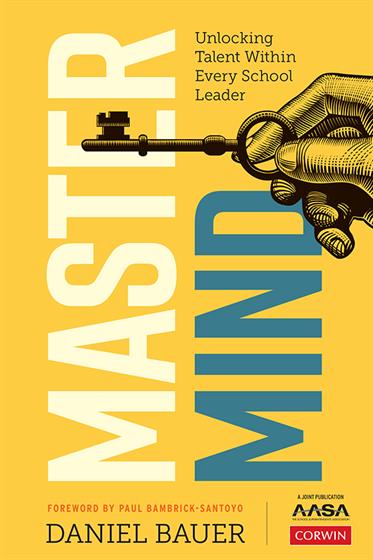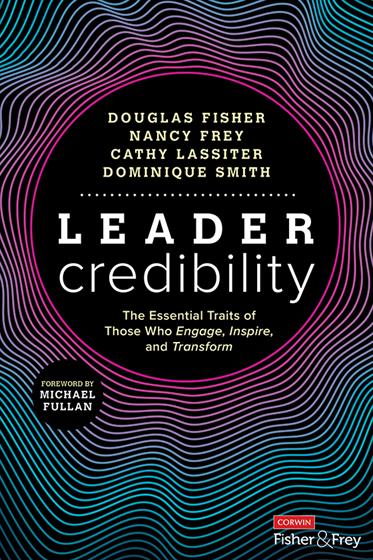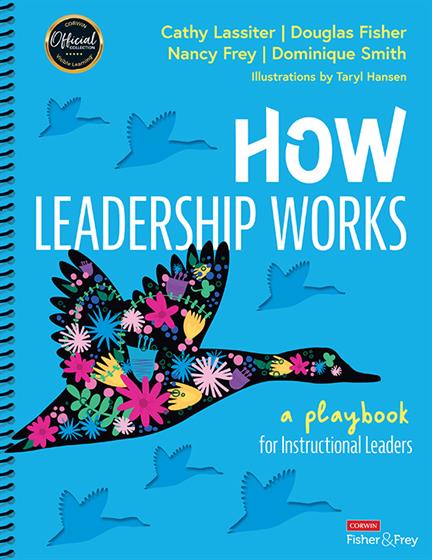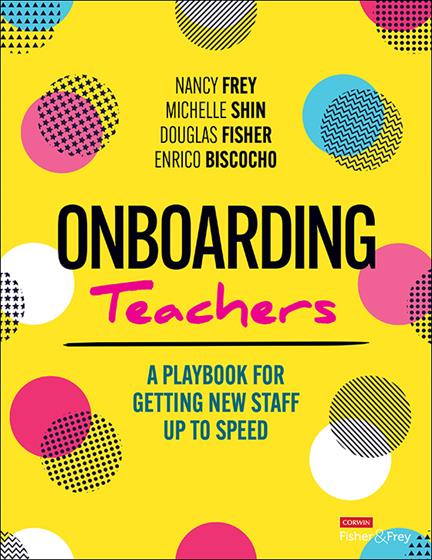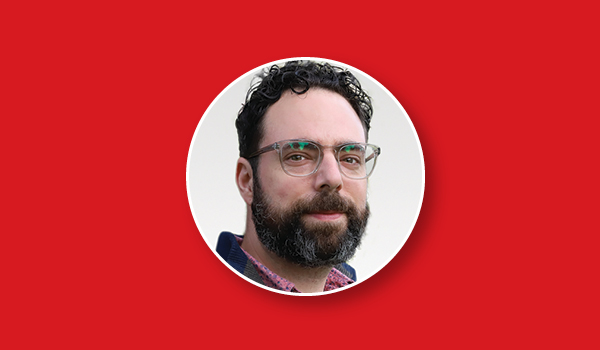Series 6 Leaders Coaching Leaders
[00:00:00.34] SPEAKER: Welcome to Corwin's Leaders Coaching Leaders podcast
with host Peter Dewitt. This podcast is from Education Leaders For Education
Leaders. Every week Peter and our guests get together to share ideas, put
research into practice, and ensure every student is learning not by chance but
by design.
[00:00:19.27] PETER DEWITT: Tanya, how are you?
[00:00:21.37] TANYA GHANS: Peter, it's been too long.
[00:00:23.71] [LAUGHTER]
[00:00:26.51] PETER DEWITT: Yes, it has. It's been a few hours since we've--
[00:00:29.44] TANYA GHANS: I know few hours, even though for our listeners I
would imagine there's at least seven days in between this. So how are you?
[00:00:37.40] PETER DEWITT: I'm doing well. It's always a good day when I
get to see you three times during the day.
[00:00:41.68] TANYA GHANS: I agree. I agree. So we have a special guest on
today.
[00:00:46.40] PETER DEWITT: Yeah, so we have Danny Bauer. And Danny is
just-- and this is not a word I use very often. I almost feel authentic-- or
unauthentic when I say it, but Danny is one of those guys that's just really
chill. He makes me at first I feel uptight when I'm talking to him because I'm
like, I wish I could be this cool.
[00:01:07.56] But Danny is a Principal Development and Retention Expert. He
is a best selling author of Mastermind, Unlocking Talent With Every School
Leader, which he actually wrote for Corwin. And he has a new book out that I
wanted to talk to him about, which is Build Leadership Momentum, How To Create
the Perfect Principal Entry Plan.
[00:01:30.15] And I enjoy the-- I enjoy when I get the opportunity to talk
to Danny because he's one of those people that definitely thinks outside the
box. But I don't think he does it on purpose. I think he just does it because that's
how he thinks. So it's always enjoyable when I get an opportunity to talk to
him.
[00:01:48.85] And one of the things that, as you know, from that people will
hear during the podcast interview is that Danny really talks about the idea of
a 90-- a 90 day plan, 90 day entry plan for principals. And I think that's
important because I remember being a principal and just kind of getting handed
the keys.
[00:02:09.07] And even though I was in a supportive district, it still felt
like, wow, I did really well in that 90 minute interview, and now I'm a
principal of a whole building. And I don't have assistant principals. And it
can be very intimidating. So I think his work around the 90 day plan is a good
one.
[00:02:27.58] TANYA GHANS: Yeah, I think it's super smart. So just to agree
with you on your first point, Danny is very zen. Sometimes I think he might be
almost meditating while he's talking to us, or I'm meditating. Or it is just--
he talks about how one of the goals of this book is to have a stress-free start
to the school year, and that that's been realized by some of the people who has
used his work. And he just lives that.
[00:02:51.22] So it makes it very-- it adds a lot of credibility to what
working on this 90 day plan, this entry plan could really do for you and
feeling like you have the confidence for starting off the school year. So,
unfortunately, there are probably too many gaps to fill when it comes to all
kinds of education training-- educator training programs, but luckily we have
people who are doing what they can to step in and fill the void. And I think an
entry plan, the first 90 days is just super smart.
[00:03:21.91] PETER DEWITT: Yeah. And for people listening to this, whether
you're listening during the middle of the school year, at the end of the school
year, and you're going to be going into the beginning of your school year, it
doesn't matter, I think his ideas around the 90 day plan are probably a good
one to pay attention to. So I hope listeners really enjoy the interview.
[00:03:42.01] TANYA GHANS: Yes, listeners, enjoy. And we will see you on the
other side.
[00:03:48.25] SPEAKER: Come explore Corwin's free new teacher toolkit and
resources. We've curated these resources based on extensive research from
teachers, coaches, and principals alike. Whether you are brand new or a veteran
teacher, find ready to go teaching tools at corwin.com today.
[00:04:06.16] PETER DEWITT: Danny Bauer, welcome to the Leaders Coaching
Leaders podcast.
[00:04:10.41] DANIEL BAUER: Peter, anytime I get to spend just a few minutes
with you is a really great investment of time. So Thanks for having me here.
[00:04:16.69] PETER DEWITT: It's good to see you. I know most people will
listen to the podcast, but if they get a chance to hop on YouTube, I want them
to just so they can see the pictures that are up on your wall right behind you
in your office. Those are really awesome.
[00:04:31.00] DANIEL BAUER: Yeah. You know, I was telling you in the
pre-interview chat as I walk in, just for people-- and, yeah, check out the
video for sure-- I see all the values that have been illustrated. And I find it
incredibly motivating and inspiring. But really better leaders, better schools.
The foundation for everything is when you get better, everybody wins. And so
I'm unabashedly very pro principle, and I just care about that leader and
helping them get better. And that's what we do.
[00:05:01.38] PETER DEWITT: Yeah. So let's get into that a bit. So you have
a new book out, Building Leadership Momentum-- it came out a few months ago--
How to Create The Perfect Principal Entry Plan. And you also did it with Ariel
Carey who I know really well because she was my former editor at Corwin. So
tell me a little bit about where this book came from because you and I were talking
offline about the 90 day principal entry plan, and you said that it's really
kind of an untapped area. So how did you get there in the first place?
[00:05:32.78] DANIEL BAUER: Well, I really enjoyed working with her. And she
was the lead editor on Mastermind when we first started that whole project,
which became a bestseller. And we're super proud of what we did there. And just
struck up a really great relationship and said, hey, what do you think about
partnering with me on this?
[00:05:52.70] And the goal was to create a book that was extremely
practical, super niche. Just on one topic, no fluff. And it's under 100 pages.
You can honestly read it probably on a flight from Syracuse to Albany, that
kind of thing. But six-- honestly, 60 minutes, 90 minutes, you've read the
whole book. And what I tell people is to gift yourself like a three to four
hour deep work block, and you can honestly read the book and crank out your 90
day plan in those three to four hours. And just set yourself up for success for
the school year.
[00:06:29.45] And as I was thinking of just like, what can I create and how
can I help people? It dawned on me like, this is actually not really taught. I
started talking to leaders. You know I coach, mentor a bunch of school leaders.
[00:06:42.86] And who showed you how to do an entry plan? Nobody, right.
What do you use? Well, and shockingly, a lot of people admitted like, oh, I
don't really have a plan. We just kind of do what we always do, try to do it a
little bit better. But a lot of it's sort of like frustrating and trying to
rethink and reinvent the wheel every single year? This is madness. So what if I
share a template that's worked for me?
[00:07:05.54] And before the book you know we created a five day challenge
where I taught this to leaders. And I saw just so much growth and so much just
results. And that kind of thing just turned it into book form, and now we got
build Leadership Momentum.
[00:07:20.08] PETER DEWITT: Yeah, so talk to me a little bit about-- because
you're right, one of the things-- because I was a school principal too, and
even in a very supportive district sometimes you're handling keys and they're
like--
[00:07:32.38] DANIEL BAUER: And that's it.
[00:07:33.23] PETER DEWITT: --it's, hey, you did really well in the
interview, so good luck. You're going to do really great. And I feel like when
you're running workshops and stuff, you'll have people say, why didn't I learn
this when I was doing my administration degree or my school leadership? And so
you're right, they kind of go in and there's all this pressure that they're
supposed to know it all.
[00:07:58.52] And that's not the case. I find that the work that you and I
both do, it's not letting people off the hook but it's kind of trying to soften
that anxiety they have because they think they're supposed to know it all. So
what do you do within those 90 days?
[00:08:16.01] What are the suggestions that you have even if it's-- people
are going to be listening to this mid-year, people could be listening to this
podcast toward the middle or-- so no matter when they listen to this podcast,
some of those people could be starting their first 90 days because we know how
principal turnover works and everything else. So what are some things you focus
on within those first 90 days that you think people-- that principals really
need to know and focus on?
[00:08:45.89] DANIEL BAUER: Yeah. Well, the plan is so important. The Stoic
philosopher Seneca said, "If one does not know which port one is sailing,
then no wind is favorable." So you have to understand there's wind at your
sails, you're going somewhere. The way I say it is if you don't know where
you're going, you might end up there. And it's like, OK, it was planned that
way.
[00:09:06.67] So, anyways, that's the guiding force, like have a plan. And
you mentioned somebody might be listening to this, a school leader it's
mid-year, or whatever they just hired, the best thing about a 90 day plan-- and
this is sort of the punch line of the book-- you could do it for the first 90
days, but then you could do it three more times. You could do it four times a
year.
[00:09:28.33] And so it doesn't matter where you are, this is a structure that
you can use to just really hyper focus over the next quarter, next 90 days.
With all my work-- and back to the one you get better, everybody wins, there's
a framework.
[00:09:43.49] And there's like five buckets that I call them. But the first
bucket is always you. It's Peter, it's Danny. It's like what do we need to
sustain us over the next 90 days? You can't pour from an empty cup, so what do
we need to fill ourselves up so that we're able to give and to serve?
Leadership is service. But if you're not taking care of yourself and running in
the red, it doesn't matter how great your plan is. Like, it's just going to not
be so good.
[00:10:11.51] So the framework is you. We talk about communication,
academics, culture, and operations. So those are the five big buckets. And then
there's a process as well, sort of the pacing. And so it's like preschool
there's some planning to be done in all those buckets. And then we break it
down, first day, first week, first month, second month, and then your last month
of the plan. And that's how we roll it out.
[00:10:37.22] PETER DEWITT: Yeah. So one of the things that we've been
hearing for a long time is that principals are-- the workload of principals has
increased. It's one of the reasons why they leave the job. NAS' PLPI had that
great study that came out a few years ago that said the workload is higher than
ever.
[00:10:53.99] And one of the things I think was interesting about that that
I learned after is that there are two researchers, Viviane Robinson and Helen
Timperley out of New Zealand that wrote a paper in 2000 that said the workload
of teachers and leaders has increased over the past 30 years. So basically our
workload has increased over 53 years, which happens to be how old I am.
[00:11:15.30] So one of the things that I'm wondering, though, is because
what Robinson and Timperley have said is that we contribute to our own workload
as much as any initiative does. So how does the work that you do with leaders
help them to a place-- because I read a lot of what you write.
[00:11:33.38] And you often talk about the difference between maybe-- and
I'm not going to use the words right, the regular leader and the ruckus maker.
How do you get ruckus makers to actually not contribute to their own workload
so much and get caught up in that? Because I feel like they just-- like they
feel trapped in that sometimes.
[00:11:56.38] DANIEL BAUER: Yeah, that's a really great point. And the
feelings, if you're feeling trapped, like, how are you going to respond in
situations? And that kind of-- it's-- you're not as curious and open minded.
You're probably really a very reactive leader versus a proactive too. So some
that I talk about with ruckus makers-- and the edges I play with, the bad guys
is what I call play it safe principles. These are folks that just protect and
tradition and doing things the way it's always been done.
[00:12:26.52] But in terms of a ruckus maker that wants to really optimize
their leadership, create more value for their campus and community, I try to
teach them like frameworks and tools and principles. And so you have something
like the pareto principle, for example, but-- also known as the 80 over 20
principle.
[00:12:44.43] And so just realizing that really 20% of what you do creates
80% of the value on your campus. So is there a way to identify what is creating
the most value? And then realizing that the other stuff is just kind of busy
work. It's not really moving the needle very far. And yet play it safe
principles will spend incredible amount of time on those things that aren't
really moving the needle. And then we're stressed out and all of the stuff
we're talking about.
[00:13:16.33] The other thing too is you were mentioning that we create our
own work. So if I'm a principal and I'm just great at clearing my inbox and
responding to everybody quick or whatever, you're just creating more work for
yourself in terms of email. Does that make sense? Because you get back to
people and you're creating a bunch of emails, sending it out, and you feel
great, inbox zero. But then those folks just all know, oh, he's on email, he
responds quickly. I'm going to send him more email.
[00:13:45.13] So that's just like a small microcosm of doing low value work
that creates more work more stress for you, versus going to see a teacher and
providing meaningful feedback. That's going to move the needle versus email.
[00:13:59.35] PETER DEWITT: Yeah, that whole management versus instructional
leadership kind of battle. And you're absolutely right about the email thing. I
find that sometimes what happens is-- we're going to use your language. This is
not mine, just in case somebody wants to complain. It's totally Danny Bauer.
But the--
[00:14:18.04] DANIEL BAUER: Email me danny@betterlead ersbetterschools.com
if you don't like this.
[00:14:21.93] PETER DEWITT: --Peter Dewitt, leave him alone. But the--
[00:14:24.33] DANIEL BAUER: Leave him alone.
[00:14:25.41] PETER DEWITT: The play it safe principles, they're focusing--
I think you're right, it feels good to kind of check that off the list. And the
scary part, especially if-- what we know is that from a self-efficacy research
standpoint is that if you feel confident in your actions, you're going to
double your efforts. And if you don't, you're going to slack in your efforts.
[00:14:49.12] I talk to a lot of principals that you do as well that don't
feel confident going into a teacher's classroom, especially when it's the
content that they never taught. What are some things that people can-- what are
some-- how are there ways-- because I know that you have a lot of successful
coaching under your belt and--
[00:15:10.06] DANIEL BAUER: Thank you.
[00:15:10.80] PETER DEWITT: So one of the things that I wonder is when
you're in those discussions with the principals, what are some steps that you
get them to take so that that idea of walking into a classroom, of content they
never taught is less scary than it might be in their head?
[00:15:29.91] Because the other side of it, as you say, the ruckus makers
are the ones who see that as the important conversations. How do you get them
to move from that play it safe mentality to that ruckus maker mentality,
especially when it comes to going into the classrooms and giving the feedback
that you were talking about earlier?
[00:15:48.24] DANIEL BAUER: Yeah, well, in Mastermind that I did with Corwin
and the National Superintendents Association, we talked about the ABCs of
powerful professional development. Authenticity is an important part in
creating psychological safety so people can show up and be themselves.
[00:16:03.88] So, first, creating a space where a ruckus maker can say,
like, I don't have confidence here, and these are the worries or concerns or
whatever. And you meet them in that moment and reflect back to them, that kind
of thing. But then in a loving way-- because the C is for challenge-- Peter,
it's not about you.
[00:16:22.75] You're lacking confidence in this person, it's a content
expert. Or what I find too, providing feedback to a teacher who's mediocre or
average, pretty easy or it feels easy. But that pro teacher, that's like the
best, a god or a goddess in the classroom, how can I ever give this person
feedback? And listen to the words, how can I? Like, it's not about you. It's
about this person.
[00:16:48.49] So sometimes just a subtle even just perspective shift, what
is it that this teacher needs? Do you know? Are you aware of their hopes,
dreams, and aspirations as a professional and where they want to go? And once
you get a sense of that, you can help them move along there.
[00:17:07.36] The other thing too is just be open minded, ask a lot of
questions. You're a mirror to me. You're a mirror when you're providing
feedback. And even the best, best, best teacher is going to miss things that
they do or don't do. And if you could just in a direct yet compassionate way
share that feedback, they're going to love it and grow because we all there's
things we don't see that only you can see. And that's part of the coaching
framework, I guess.
[00:17:36.33] PETER DEWITT: Yeah. I love the idea of going in as a learner.
I feel like--
[00:17:41.86] DANIEL BAUER: For sure.
[00:17:42.73] PETER DEWITT: --the best experiences I have are the ones
where-- even when you're running a workshop or coaching, going in as I want to
see what can I learn. Because from a ruckus maker mentality, I think we all
deal with that. I mean, you deal with that. Even though you wrote a book on it,
I'm sure you have that mentality. And me too. Like, we get called experts all
the time, and I don't feel like an expert. I feel like someone who wants to go
in and learn because we don't have credibility in all areas.
[00:18:11.74] I often talk about when I first started in this role 10 years
ago, I was an elementary school principal and an elementary school teacher.
And, yeah, I had a lot of experience, 11 years as a teacher, eight years as a
principal. But then I started working in these huge high schools with over
3,000 students. That's not an area that I had credibility.
[00:18:29.62] So the ruckus maker mentality is something we all have to have
because we all have those areas that can actually be scary as well. What is--
so far the book's been out for a few months. I know that the summertime was
definitely a big time because you were going to be kicking off the school year and
all that stuff.
[00:18:49.90] Is there anything that you've heard that surprises you? Like
from people that you've been working with going through-- because I know that
just the two of us when you write a book, we have a great opportunity because
we can use that content in the workshops that we're running.
[00:19:05.53] I mean, that's why we write the book. And so you-- it's great
because you start to hear that direct feedback and stuff. So is there anything
that you've been hearing that maybe surprised you or something that you didn't
think about before when you had written the book?
[00:19:20.46] DANIEL BAUER: So just to clarify the question, so like
somebody-- a ruckus maker has read the book and then has given me feedback. And
has that surprise-- yeah. Well, so John Unger is a principal-- I think it's an
elementary school. I'll have to double check that. But I do know he's down in
Arkansas.
[00:19:36.30] And after he implemented the plan, something that surprised
me-- and remember-- so just to connect some dots, we had the same principal
who's like super stressed out, reactive, this kind of thing. John said, Danny,
after I implemented what you taught in the book, my start to the school year
was stress-free.
[00:19:54.27] PETER DEWITT: Wow.
[00:19:55.05] DANIEL BAUER: Yeah. So, I mean, I didn't make that up. That's
his words, a stress-free start to the school year? I'll take it, right. And
then another friend of mine and also somebody I've coached and mentored for
quite a while, Chris Loeffler who's a principal in Delaware, he showed his 90
day plan to his supervisor. And the supervisor said, that's the most detailed
entry plan I've ever seen.
[00:20:18.21] So, again, connecting more dots and not having that
confidence, giving feedback or whatever, but how about just starting the school
year. Here's the keys, good luck. Well, imagine entering a school you're just
so confident that you're ready and you're prepared and set up for success. So
those are the kind of things I was hoping to hear. I don't know that they
necessarily surprised me, but it really is satisfying to get that kind of
feedback.
[00:20:44.86] PETER DEWITT: What kind of transfer-- because I know that you
said when we all do well-- you were talking about that-- what kind of transfer
have you seen with principals using it with teachers? Because I would imagine
that when a principal is really kind of engaged with the 90 day plan and has
done the work, that metacognitive.
[00:21:04.90] I mean, it's metacognitive because you have to think about why
use it in the first place. But also like looking at the future with goals and
that stuff, what is the transfer that you've heard about with principals who
are using this with teachers? Because I would imagine teachers would benefit
from this as well.
[00:21:22.53] DANIEL BAUER: Well, I think it also-- it breeds and just
creates more confidence because there's clarity in the direction we're all
headed. And the process, I truly believe a principal is hired to lead. So you
draft the plan first on your own, but then you start to incorporate more and
more voices to get feedback and make the plan perfect.
[00:21:46.35] So as you go through that collaborative process, the fact that
folks do have a voice in it and it's a shared goal that we're moving toward,
that just, yeah, I mean, breeds confidence throughout a culture. And that's a
beautiful thing.
[00:22:00.67] So the other deal too if you ever-- that metaphor, folks being
in a boat rowing in different directions, that's just because of a lack of
clarity. Often we don't know where we're going or how to do it. And you haven't
defined success in the nitty gritty detail that you need to.
[00:22:19.30] But with a plan, if you do it the right way, it's really
clear. Like, this is where we're headed, this is what success looks like. And
then people can figure out, all right, here's how I can contribute to this
collective effort. So, yeah, everything I teach is for sure applicable to the
classroom as well.
[00:22:35.94] PETER DEWITT: Talk to me a little bit about the Mastermind
process. You've been doing that for a while. What does that look like with the
groups that you-- is it-- is this like a monthly thing? Is this a-- what does
Mastermind look like? And how can people get involved with that?
[00:22:52.93] DANIEL BAUER: Yeah. So it's actually a weekly. So a bit
intense in terms of the cadence, but it's incredible support. So at this point,
we have a-- Peter, we have 11 different cohorts, with 90-ish school leaders
from around the world. Mostly North American times, so Pacific, Central, East
Coast, but we do-- we've opened up a group that is for Europe, Africa, and the
Middle East. And they meet Monday nights, their time, but earlier on Mondays
for us.
[00:23:25.60] We even have two women's only cohorts and our first ever bipoc
cohort. So we're doing some really fun stuff. But, again, thinking about
confidence and that kind of thing, one of the biggest challenges in that is
going it alone. So first having the perspective just on me, how am I ever going
to do this? But then trying to do it on your own.
[00:23:46.09] Isolation is the number one enemy of excellence. So if you had
a cohort, a board of advisors of other growth minded school leaders to meet
with weekly, and go in depth all things education and leadership, there's just
no way you're not going to grow. You're just going to get better. And the nice
thing is having these critical conversations with your peers, you also get an
inside look on how other leaders process and think and problem solve. So that is
absolutely invaluable. But, yeah, it's a weekly cadence.
[00:24:23.08] PETER DEWITT: That's awesome, though. I mean, you know we know
it's needed because going back to the NAS' PLPI study, one that was cited was
the fact that principals don't feel like they have access to coaching. So
you're providing access to coaching.
[00:24:41.29] I think the virtual sense has really opened up-- I mean, I
know people were doing it before COVID, and I get that. But I think because of
COVID, people really saw more of the value in this could be-- this could work
for us. So we don't have to travel, we can actually tune in. So I think that
that definitely helps people understand that access is a little bit more
immediate than maybe they were thinking beforehand, but--
[00:25:06.07] DANIEL BAUER: Yeah, I feel like the guy that was listening to
Burna Boy who's blown up these days and has great music. I was listening to him
before the Grammys and all this kind of stuff, so I feel like that. But we were
on Zoom playing on that way before the pandemic, so we've been on there since
2015. And I'm like, I was one of the originals, you know. So--
[00:25:25.48] PETER DEWITT: I think it's less-- I mean, I think, yeah, there
are the early adopters, but there are the people that actually were not-- well,
they were the play it safe people that maybe didn't see it as a viable
resource. And then during COVID, they definitely saw it as a viable resource.
[00:25:44.38] DANIEL BAUER: Yeah, 100%.
[00:25:46.27] PETER DEWITT: Well, Danny Bauer, it's always good to talk to
you. The book is Build Leadership Momentum, How to Create the Project Principal
Entry Plan. And you did it with Ariel Carey who is one of my favorite people
too. But, you know, congratulations on everything. And thanks for being on the
Leaders Coaching Leaders podcast.
[00:26:05.10] DANIEL BAUER: Like I said, always a privilege to spend some time
with you. So thank you.
[00:26:12.44] TANYA GHANS: So, Peter, I thought that that was prime Danny
ruckus maker Bauer. It was really-- he never fails to deliver in particular
because of his authenticity. I mean, he really does seem to live, breathe, and
practice what he preaches.
[00:26:30.20] Something that stood out to me, I thought you asked a really
good question around one of the reasons principals may not get to the hard work
or they might be-- I can't remember the phrase all of a sudden, but it's the--
I think it's the play it safe principle.
[00:26:43.99] PETER DEWITT: Play it safe.
[00:26:44.60] TANYA GHANS: Right. The ones who are afraid to do the hard
work is because it is very hard. It is particularly quite scary to go into a
teacher's room and have to give them feedback. And maybe not maliciously and
not on purpose, it can be easy to look for reasons to avoid that.
[00:27:01.88] But this simple thing that came up, which is just perspective
shifting, which is if you can understand that when you're going in to have that
conversation-- maybe two things stood out-- go in as a learner. So if we do
that, it helps to mitigate the fear that you're not the content expert or you
don't know.
[00:27:22.86] And go in remembering that it's not about you, and maybe it's
not even about the teacher. I mean, while it's certainly about both of you,
it's definitely about the kids. And if you can have that front and center, it
might make that first step, which is arguably the hardest step, happen to get--
to make sure that you're not spending time on the stuff that really does not
have high impact. So that really stood out to me. I thought that was great.
[00:27:49.89] PETER DEWITT: One of the-- I think one of the threads-- one of
the things on my mind as I was doing the interview, as you know, we interviewed
Pam Snow from New Zealand about reading. And when the podcast interview is
available, I think people need to be able to listen to that one too.
[00:28:07.54] But one of the things Pam Snow was talking about was literacy
as a public health issue. And after hearing that from her, when I go into a
conversation with somebody like Danny and we're talking about school
leadership, I'm thinking the same thing.
[00:28:22.56] Education is this public health issue where we want to make
sure that we're getting it right. And going into challenge ourselves and
challenge the thinking of the people that are with us, playing it safe is no
longer OK. We have to be able to push the boundaries because that's, in fact,
what leaders do. And Danny you know refers to them as ruckus makers.
[00:28:43.95] So engaging in those conversations is really important. And
just sitting, checking email, I get it. I understand, we both have been school
leaders. So I get the idea that sometimes that feels good because we can tick
something off our list, but it's really not-- is that contributing to what Pam
Snow would call a public health issue where we're actually trying to get the
best education possible for all of our kids within the school. So I hope that
makes sense.
[00:29:14.19] TANYA GHANS: I think that's a mic drop, actually. I think it
makes a lot of sense. And that really gets to the heart of the issue of why I
think we're doing what we're doing on this podcast. What Danny and Pamela Snow
and other people who are making noise in this area, it's because we understand
that. I mean, education is one of the most important things that we do.
[00:29:35.86] So going back to his work, being really clear about what your
first 90 days are and what it is that you're trying to do and where you're
going to put your time because it is a scarce resource, there's no question
about it. If you focus here, you can't focus there.
[00:29:51.54] Getting really clear about that is an extremely important first
step because, like another guest of ours says, it can be very easy to lose your
North Star once you get into the business of doing the day to day work. It gets
very easy. So I think it's a great contribution. I really enjoyed this
conversation.
[00:30:09.15] PETER DEWITT: Yeah, in the past few workshops, I've been asked
to-- I do this thing called a micro lab protocol. And there are a series of
three questions, and people get a minute to think about the prompt and then
they get a minute to talk about it to their two other peers.
[00:30:26.20] And one of the things that one school district wanted me to
focus on is the legacy of the leaders within the room. So I was in El Paso,
Texas, and-- so the first question I put up was, what do you want your legacy
to be as a leader?
[00:30:39.72] And I've used that a few times on the road since then, and
it's a very powerful question because when we're in it, we don't always think
about our legacy. We think about the day to day, we think about answering
emails. But I think when you think about leadership as down the road when
you're looking back, what do you want your legacy to be? Something I think
about quite a bit these days.
[00:31:04.08] I think that also will contribute to making that 90 day plan
and also making those conversations that we could consider or what Pam Snow
considers a public health issue really important because, do you want to know
in 10 years down the road that you engaged and challenged those conversations,
or that you took the path of least resistance? And I think that's what Danny's
talking about with ruckus makers as well, is not taking the path of least
resistance.
[00:31:30.19] TANYA GHANS: Yeah, yep. And doing it in a way that you can
still sustain yourself for the long haul, right? It's the combination of both.
[00:31:38.41] PETER DEWITT: Yeah. Well, Tanya, another successful
conversation. And if people want to talk to us and give us feedback on the
podcast or even say, Peter, why didn't you ask this question? Feel free to give
feedback and stuff. But thank you to everybody who listens. I can speak for
both of us to say we really appreciate it. And I really appreciate the people
that come up to me when I am on the road to talk about how they listen to this
podcast as well.
[00:32:07.25] TANYA GHANS: That's wonderful. Yeah, we're doing our part to
change the world 20 minutes at a time.
[00:32:11.99] PETER DEWITT: That's right.
[00:32:14.30] TANYA GHANS: Until next time, Peter, I always enjoy learning
with you.
[00:32:17.30] PETER DEWITT: Yeah, it's good to see you too. And I'll
probably see you in about an hour and a half.
[00:32:20.99] TANYA GHANS: Sounds about right. Bye bye, Peter.




